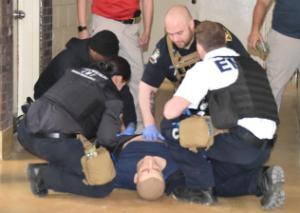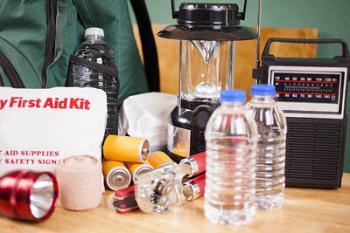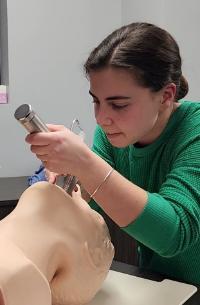

The Center for Disaster Medicine, at its core, is an Academic entity that places the learning needs of its students and stakeholders first. Educational innovation highlights the Center’s constant pursuit of exploring new modalities in teaching, novel learning theories, realistic experiences, and a perpetual reexamination of effectiveness. Educators within the CDM maintain involvement in the study of learning, educational technology, knowledge and skills retention, and new trends in training delivery.
Simulation, or the imitation of a real-world system or process, is one specific educational modality that is utilized by the CDM to complement our learning experiences in medicine, emergency preparedness, emergency response, and organizational systems. The Center’s expertise in simulation education and technology allows for increased value in experiential learning. Simulation has been evidenced to improve safety, performance, and efficiency in a multitude of professions, including healthcare, aviation, the culinary arts, manufacturing, organizational business performance, and military science.
T he Center for Disaster Medicine’s (CDM) Division of Operational and Tactical Medicine focuses on researching and teaching the best practices for delivering high-quality, high-impact care in environments outside the realm of traditional medicine. Utilizing the concepts and guidelines set forth by the Committee on Tactical Combat Casualty Care (CoTCCC) and Committee for Tactical Emergency Casualty Care (C-TECC), the CDM provides guidance and education to law enforcement officers, pre-hospital healthcare providers (e.g., emergency medical technicians, paramedics, and firefighters), in-hospital healthcare providers (e.g., doctors, nurses, etc.), and the civilian community as a whole. Through partnerships with federal, state, and local government organizations and non-governmental organizations (NGOs), the CDM is able to provide educational opportunities both on-campus and remotely.
he Center for Disaster Medicine’s (CDM) Division of Operational and Tactical Medicine focuses on researching and teaching the best practices for delivering high-quality, high-impact care in environments outside the realm of traditional medicine. Utilizing the concepts and guidelines set forth by the Committee on Tactical Combat Casualty Care (CoTCCC) and Committee for Tactical Emergency Casualty Care (C-TECC), the CDM provides guidance and education to law enforcement officers, pre-hospital healthcare providers (e.g., emergency medical technicians, paramedics, and firefighters), in-hospital healthcare providers (e.g., doctors, nurses, etc.), and the civilian community as a whole. Through partnerships with federal, state, and local government organizations and non-governmental organizations (NGOs), the CDM is able to provide educational opportunities both on-campus and remotely.
The CDM develops training courses that involve care under austere conditions, limited resource availability, inter-agency collaboration and cooperation, incident management and command concerns, and medical control. Simple skills (e.g., tourniquets, wound packing, patient movement, etc.) are evaluated during complex environments and repeated until the desired metrics are met. Tactical concerns are evaluated during scenario-based training, which provides the participants with current best practices.
The CDM Division of Operational and Tactical Medicine also supports the training efforts of the Westchester County Department of Emergency Services, Westchester County Police Academy, Dutchess County Emergency Management, New York State Department of Health Bureau of EMS and Trauma, and many others.
CDM hosted a two-day course on Operational Medicine for law enforcement with participants from the FBI, Homeland Security and local police departments. Officers were trained in didactic topics in basic tactical medicine, including sensory-impaired environments, direct threat care, indirect threat care and evacuation care.

The NYMC Center for Disaster Medicine (CDM) provides workshops, training and education to healthcare providers in the healthcare and public health sectors in order to be better prepared for natural or man-made disasters including mass casualty incidents and bioterrorism. CDM provides specially tailored programs for healthcare and public health professionals by reviewing the research and lessons learned from past events in order to improve future emergency response.
CDM has in-house expertise on healthcare and public health emergency preparedness and uses that knowledge and experience to improve the capabilities of the healthcare sector at the local, national and international level. CDM staff has shared lessons learned with healthcare professionals throughout New York State and as far as Spain.

The NYMC Center for Disaster Medicine (CDM) has expertise in emergency preparedness for special populations such as but not limited to children, the elderly and people with disabilities. Such special populations require specially tailored programs for its consumers and healthcare professionals.
We also offer American Heart Association (AHA) courses such as Pediatric Advanced Life Support (PALS) and Pediatric Emergency Assessment, Recognition and Stabilization (PEARS) specifically designed for pediatric patients.
The Center for Disaster Medicine’s Division of Prehospital Emergency Medicine and Emergency Management focuses on research, education, and training within these fields in order to best prepare first responders and the public to meet the needs of their communities during their times of need, at both the local and global levels. The CDM maintains expertise in all facets of the prehospital emergency medicine system, especially:
The CDM’s work in Emergency Management focuses on research, guidance, and education to assist individuals and organizations to best prepare for, protect against, respond to, recover from, and mitigate the potential effects of all types of disasters and emergencies on a local and global scale. The CDM maintains expertise in all facets of emergency management, especially:
 Every July, the Center for Disaster Medicine (CDM) hosts a monthlong Summer Fellowship for First Year medical students. These students are those that have an interest in Emergency Medicine and/or Disaster Medicine. As a part of this month of learning, the medical students spend time rotating through the Emergency Department at Metropolitan Hospital (NYC Health and Hospitals), observation shifts with Empress Ambulance Services, and take a number of courses (e.g., Basic Life Support, Advanced Cardiac Life Support, Pediatric Life Support, Prehospital Trauma Life Support, etc.). They also are taught skills in patient assessment, airway management, and intravenous insertion. The students are also given opportunities to develop and/or be a part of existing research projects.
Every July, the Center for Disaster Medicine (CDM) hosts a monthlong Summer Fellowship for First Year medical students. These students are those that have an interest in Emergency Medicine and/or Disaster Medicine. As a part of this month of learning, the medical students spend time rotating through the Emergency Department at Metropolitan Hospital (NYC Health and Hospitals), observation shifts with Empress Ambulance Services, and take a number of courses (e.g., Basic Life Support, Advanced Cardiac Life Support, Pediatric Life Support, Prehospital Trauma Life Support, etc.). They also are taught skills in patient assessment, airway management, and intravenous insertion. The students are also given opportunities to develop and/or be a part of existing research projects.